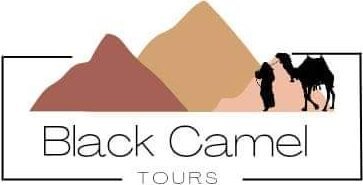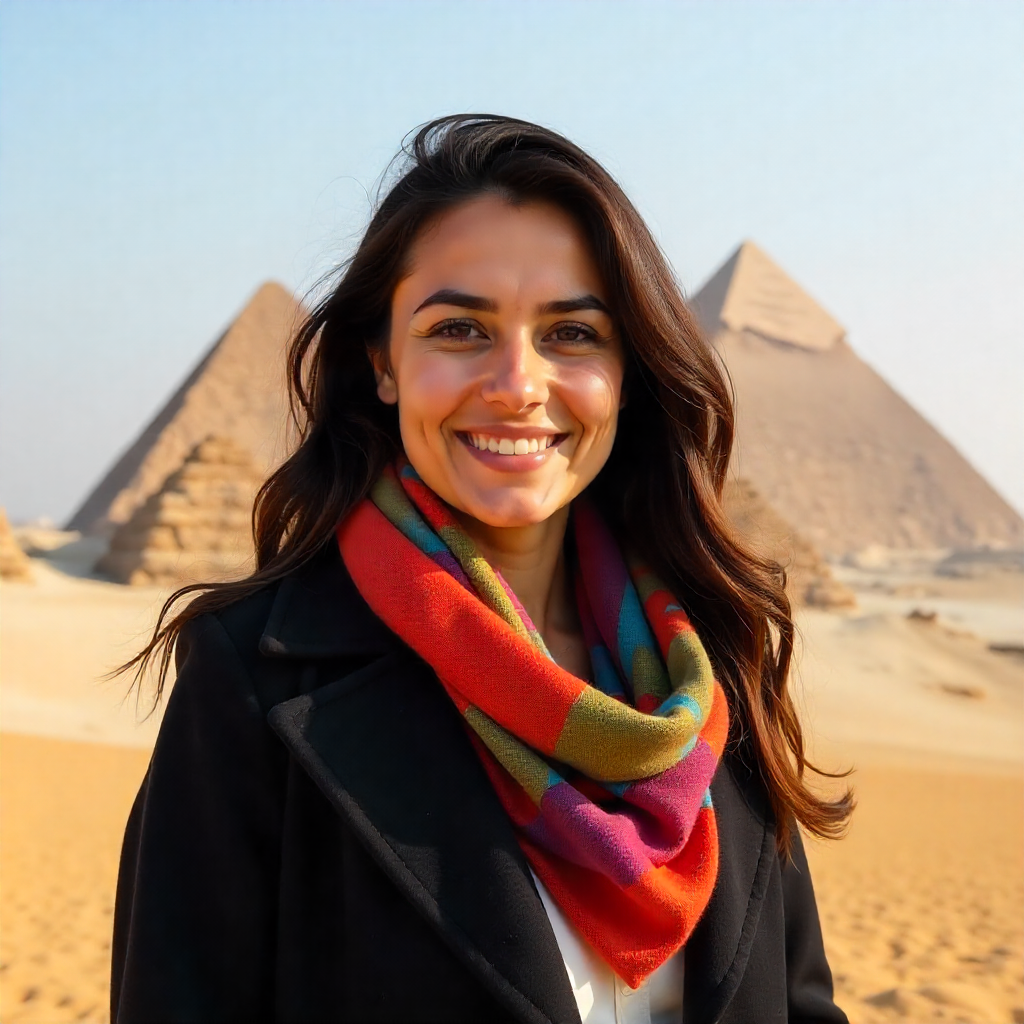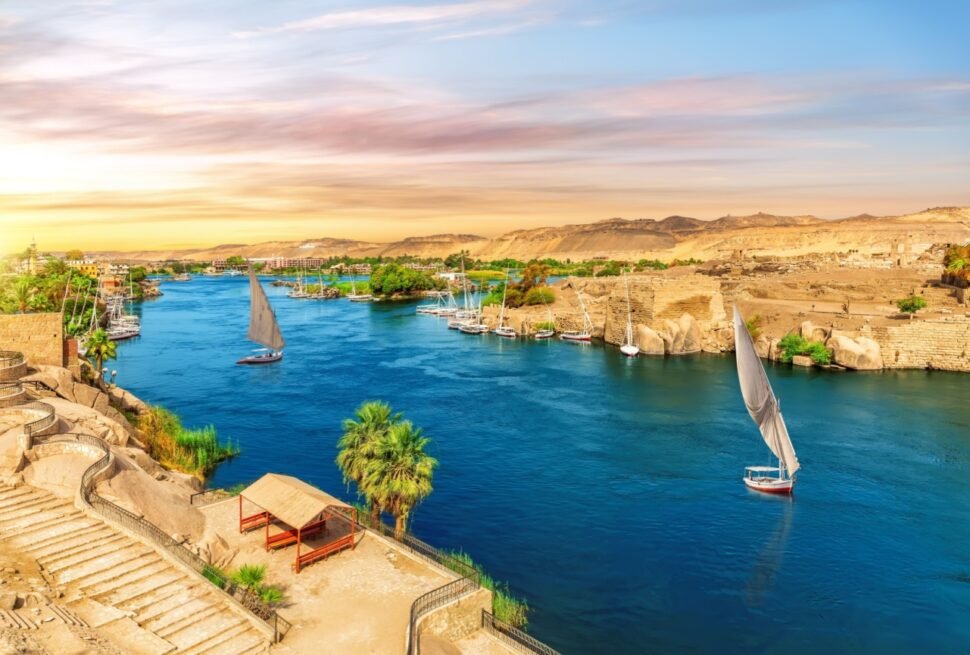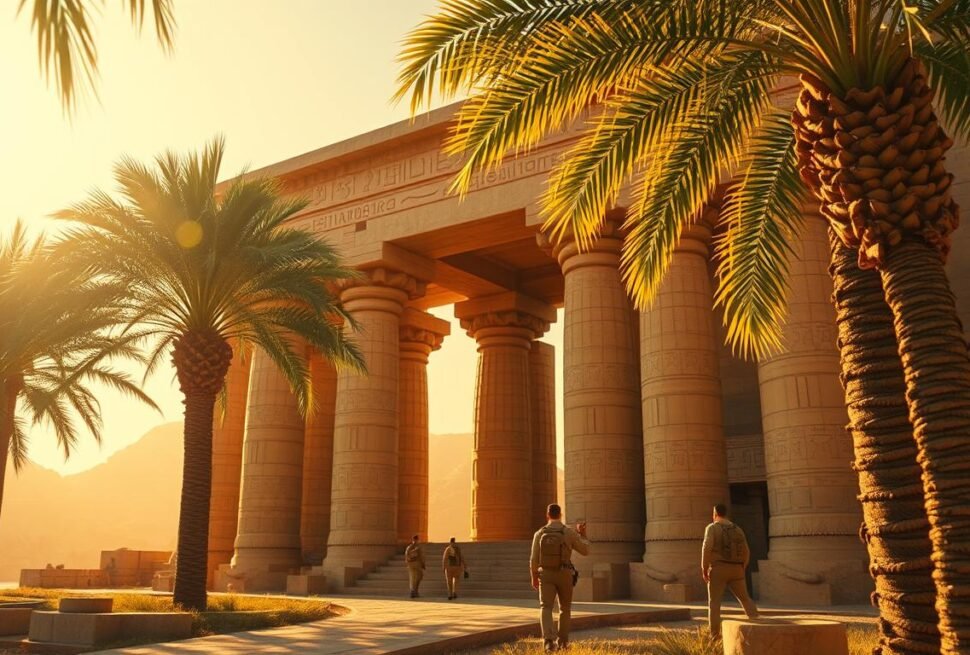Have you ever wondered how a bucket‑list trip to ancient wonders stacks up against the real logistics on the ground? This guide gives a friendly, practical look at what to expect when you plan a trip that blends world‑class history with modern travel realities.

Expect awe‑inspiring pyramids, temples, and tombs—but also strict security, checkpoints, and permit rules. Many first‑timers hire a vetted local guide and driver to remove guesswork around permits and tricky transport. Wi‑Fi often needs a text code, so an eSIM like Airalo can be a simple fix.
Pack small EGP and crisp $1 bills for tipping, use bottled water, and bring a basic med kit. Weather shifts from cooler Cairo to very hot south cities, so timing matters for site visits and hotel choices.
Need help booking trusted ground support? Contact us: 📩 Booking@blackcameltours.com | 📞 +43 660 9081449 | +201080733101 | 🌐 blackcameltours.com
Key Takeaways
- Balance bucket‑list sites with real‑world security and logistics.
- Hire vetted local guides to simplify permits and transport.
- Bring small local cash, crisp $1 bills, and a med kit.
- Use an eSIM for smoother connectivity at airports and hotels.
- Plan visits by season and time of day to avoid heat and crowds.
- Choose well‑rated hotels for comfort and quieter stays.
What to Expect on Your First Trip: Awe, Culture Shock, and Unforgettable Moments
Expect jaw‑dropping monuments at nearly every turn, and plan your days to soak them in without getting overwhelmed. Marvels like Giza, Karnak, and Abu Simbel often exceed expectations, but the practical side of travel shapes how you remember them.
Iconic sites come with airport‑style screening, crowded entrances, and lots of vendors offering help you didn’t ask for. A private guide or driver can cut through the noise, explain reliefs clearly, and pick the best rooms to visit.
“A short, focused morning at a major site and a relaxed afternoon beat trying to see everything at once.”
- Balance spectacle with logistics: tickets, checkpoints, and crowd flow matter.
- Beat info overload: plan shorter stops and take breaks to absorb the history.
- Handle haggling: a firm smile and “no thank you” usually works; keep phones secure.
Most people you meet are warm and proud to share their past. Still, accept that permits, checkpoints, and traffic are part of the country way of getting around.
Need help? Keep our booking contacts handy: 📩 Booking@blackcameltours.com | 📞 +43 660 9081449 | +201080733101 | 🌐 blackcameltours.com.
Is Egypt Safe for Solo Travelers? What Security Really Looks Like
You’ll notice a steady security presence at attractions, hotels, and key intersections—this is deliberate and mostly reassuring.
Tourism police, hotel and attraction checkpoints, and highway permits
Expect visible measures: tourism police at major sites, metal detectors at entrances, and highway checkpoints are common. Vehicles may be inspected with mirrors and dogs.
The Tourism Police often log routes and call guides to confirm arrivals. This can feel strict, but it adds a layer of reassurance for people on the move.
Areas to review in advisories and registering with STEP
Before you go, check government advisories for border regions such as Sinai. Some roads and convoys run only at set hours and need permits.
U.S. travelers: register with STEP to get updates about the country and nearby border zones. That simple step keeps you informed of sudden changes.
Group security norms and why guided days can reduce stress
Groups larger than five or six may be assigned extra security depending on nationality. Solo visitors and small parties often benefit from joining guided day tours.
Professional guides handle permits and sudden closures, saving you time and worry. Use common sense—keep valuables zipped and documents handy.
| What | Where | Why | What to Do |
|---|---|---|---|
| Tourism Police checks | Major sites, intersections | Track movements, confirm arrivals | Carry ID, follow guide instructions |
| Vehicle inspections | Highways, hotel entrances | Safety and contraband prevention | Allow extra time, keep documents accessible |
| Permit/convoy rules | Some roads (e.g., Abu Simbel) | Controlled travel windows | Book vetted drivers who hold permits |
Need help booking vetted drivers and guides? Save our contacts: 📩 Booking@blackcameltours.com | 📞 +43 660 9081449 | +201080733101 | 🌐 blackcameltours.com.
Best Time to Visit: Weather by Region and Season
Weather varies sharply from Cairo to Luxor and Aswan, and that affects daily plans.
North vs south: Cairo to Luxor/Aswan temperature patterns
Summer (June–August) is very hot: expect 29–41°C (85–105°F). Southern destinations like Luxor and Aswan run noticeably hotter than northern cities such as Cairo.
Winters (Dec–Feb) are milder, with highs near 17–24°C (63–76°F). In January, Cairo highs hit about 17°C while Luxor can reach 27°C, and mornings can dip to ~7°C.
Heat-readiness for sightseeing and choosing cooler months
Plan your time to avoid mid‑day temple visits in the south. Early mornings and late afternoons are far more comfortable for open‑air sites.
Shade, hydration, and slower pacing keep sightseeing safe. A hotel pool is a smart midday cooldown when southern sun spikes.
- Start in cooler city hubs and move south as days warm.
- Pack light layers for chilly mornings and evenings.
- Expect crowds to rise in cooler months; balance comfort vs demand.
- Check forecasts and flex your daily plan to match light and weather.
One practical note: confirm site hours during shoulder seasons to fit daylight and local rhythms on your trip egypt.
Solo Travel in Egypt: Tips for First-Time Visitors
Pair a few guided days with free afternoons so you dive deep without losing your own rhythm.
Confidence boosters: private guides, group tours, and day-by-day structure
Hire vetted guides and drivers for the first days to handle permits, checkpoints, and sudden changes. That makes logistics invisible so your focus stays on the experience.
Consider joining a small group for major sites like Giza, the Valley of the Kings, or Abu Simbel. Group days give structure and social moments without sacrificing solo freedom.
Balancing independence with expert support on the ground
Keep most afternoons free for markets, cafés, and photography. Build a simple daily plan: one major site in the morning, a lighter museum or walk later.
“Guided Nile cruises are great social anchors—Egyptologists bring the past to life and adapt plans around closures.”
- For women travelers, choose guides who respect dress norms and set clear vendor boundaries.
- Carry small bills for tipping, register with STEP, and share your itinerary with someone back home.
- Book hotels near main sites to cut transfer time and reduce evening commutes.
Need local support? Save our contacts: 📩 Booking@blackcameltours.com | 📞 +43 660 9081449 | +201080733101 | 🌐 blackcameltours.com.
Flights, Airports, and Domestic Connections
Getting from terminal to takeoff often means two security lines and inconsistent rules about carry-ons. Expect an entry scan and a gate‑level check. Rules on liquids and aerosols vary by airport; Hurghada has been known to confiscate hairspray and unopened water.
Plan extra time at every airport. Keep boarding passes and ID in an easy pocket so you can move through checks quickly. Pack toiletries in checked bags when possible and carry an empty refillable bottle to fill after the last scan.
Practical airport tips
- Arrive earlier than usual — you’ll find multiple screening points and spotty enforcement of rules.
- Use an eSIM (Airalo works well) so you can get Wi‑Fi codes and message your driver without a local SIM.
- Domestic flights can save long overland hours between Cairo, Luxor, Aswan, and Abu Simbel.
- Confirm baggage rules on each leg, pack to minimize loose metal, and bring snacks in case gate options are limited.
Safety procedures are common. Allow buffers between connections and save our local contact info to coordinate pickups if delays affect your trip — you’ll find that planning this way cuts stress and keeps your day moving.
Getting Around: Drivers, Trains, Buses, and the Cairo Metro
Choosing the right transport can turn long transfers into easy parts of your itinerary.

Skip self‑driving. Lane discipline is poor, speeding is common, and accidents happen. Cairo traffic is intense and many lights do not work. Hiring a vetted driver is the safer, saner way to move between places.
Trains and buses have pros and cons. Trains can be crowded, hot, and slow on many routes. Buses and microbuses serve locals, but microbus routes use Arabic numerals and are confusing to tourists.
Use the Cairo Metro for quick city hops. It is the only rapid transit system in the country and saves time in central Cairo. For longer legs, weigh an overnight train against a short domestic flight.
Domestic flights often beat the road. Cairo to Luxor or Aswan by air cuts hours of bumpy highway time and reduces fatigue. Always factor safety and comfort when you plan trips.
| Option | Best Use | Drawbacks | Practical Tip |
|---|---|---|---|
| Vetted driver | Cross‑city transfers, checkpoints | Higher cost than public transport | Book through reputable providers; check seat belts and AC |
| Train | Daytime scenic routes, budget travel | Crowded, slow, noisy sleepers | Choose AC daytime services; expect delays |
| Bus / Microbus | Short regional hops; local flavor | Unpublished routes, tight crowding | Use buses with clear signage; avoid microbuses without a local helper |
| Domestic flight | Long distances (Cairo–Luxor/Aswan) | Extra airport time, baggage rules | Book early; pack toiletries in checked luggage |
- Keep small cash for tolls and bathroom stops.
- Allow extra time for checkpoints and random slowdowns.
- Prioritize safety: a driver usually lowers risk over renting a car.
Top Solo-Friendly Destinations and Must-See Sites
Open your itinerary with Cairo and Giza; seeing artifacts first helps the ruins make immediate sense.
Cairo and Giza deliver the pyramids, the Sphinx, and museum halls that frame ancient life. Plan a morning at the Egyptian Museum to connect objects with the massive outdoor sites you’ll visit later. Expect visible security at each entrance; keep tickets and small bills for day‑of needs.
Cairo to Luxor
Head south to Luxor for vast temple complexes and the Valley of the Kings. Walk Karnak’s hypostyle hall and time your Valley of the Kings visit during cooler hours so you can linger inside royal tombs.
Aswan, the Nile, and Abu Simbel
In Aswan, cruise or drive to Philae and Kom Ombo — the latter has a quirky crocodile museum beside its shrines. Abu Simbel is a popular day option; departures match permitted highway hours, so an early start helps beat heat and crowds.
“An Egyptologist‑led tour links reliefs and stories across destinations, turning stone into narrative.”
- Group major sites on guided days and leave evenings for Nile-side walks.
- Pace museum visits and café breaks to keep the experience joyful, not rushed.
Culture, Dress, and Etiquette: Blending In Respectfully
Dressing with a bit of modesty makes daily life smoother and shows respect for local norms. In busy urban areas, simple choices ease interactions and lower unwanted attention.
City vs temple attire: In cities, wear lightweight clothes that cover shoulders and knees. Temples are more relaxed, but covering ankles and shoulders is still a good rule.
Mosque visits and footwear
For mosques bring a scarf to cover hair, long sleeves, and ankle‑length bottoms. You must remove shoes; socks keep feet comfortable on cool stone floors.
Practical phrases and polite cues
Learn a few Arabic basics: shukran (thank you), Sabah al‑khair (good morning), Marhaban (hello), ma‑aa salama (goodbye), na‑am (yes), la (no), min fadlik (please). A warm greeting changes how people meet you.
- Choose breathable fabrics to stay cool while staying covered.
- Pack closed‑toe shoes for rough sites and sandals for easy hotel wear.
- Accept small portions of food politely and tip modest amounts for service.
“Modesty usually brings smoother interactions and shows respect for the local country culture.”
Women Traveling Solo: Practical Advice for Comfort and Confidence
A few simple habits can turn an uncertain day into a confident one when you’re exploring crowded bazaars and major sites.
Modesty, stares, and when to cover
Modest clothing helps in cities but isn’t mandatory at ancient temples. Carry a light scarf for mosque visits and evenings. Adjust layers as temperatures rise to stay comfortable.
Navigating vendors, photos, and firm boundaries
Expect photo requests and friendly offers. A calm, clear “no, thank you” usually works. Avoid handing over your phone; use a tripod or ask a trusted guide to help.
Choose guided options for peace of mind
Small‑group or private tours ease logistics at busy sites like the Valley Kings and other crowded places. Guides and Egyptologists manage permits, pace, and shade breaks so you can relax.
- Pack modest layers and a scarf for mosques and windy afternoons.
- Keep small bills handy for bathrooms and small favors.
- Share daily plans with your hotel and a contact back home.
- Start with guided days, then add independent afternoons.
- If something feels off, trust your instincts and move to safety.
“Start with guided mornings, then explore nearby cafés in the afternoon.”
Money, Tipping, and Paying Your Way
Managing money well makes each day easier—know when to use cards and when cash rules. Carry both EGP and a bit of USD to handle different situations across the country.
Cash vs cards, ATMs, and when USD is accepted
ATMs are common in big city centers and hotels, and they are the easiest way to get local notes. Use hotel or bank machines to reduce fees and the chance of a skimmed card.
Cards work at mid‑ to high‑end hotels, restaurants, and shops. Still, markets, small cafés, and many site entrances prefer cash. Some tours and services accept USD, but do not rely on it everywhere.
Everyday baksheesh: bathrooms, small favors, and service norms
Keep a short list of typical amounts to avoid awkward moments. Restaurants: about 10% (15% at upscale spots). Café attendants: 5–10 EGP. Restrooms: 5–20 EGP depending on the facility.
Guides and drivers are usually tipped separately—many operators recommend around $25 USD per day for an Egyptologist guide, and modest sums for drivers per transfer. U.S. visitors often tip attendants $0.50–$1 for small help.
Bringing crisp $1 bills and knowing typical tip ranges
Bring new, crisp $1 bills for quick tipping and places that prefer USD. Carry a small coin purse to separate denominations and a money belt for longer outings.
- Expect to use both cash and cards—split your cash stash into two safe spots.
- Keep receipts when paying by card at hotels to avoid dynamic conversion.
- If unsure about an amount, ask your guide or the company handling your booking.
Practical note: tourists sometimes overtip; stick to typical ranges and keep small EGP handy near busy bathroom areas at major sites.
Eating Well and Staying Healthy: Food, Water, and Alcohol
Food often arrives family-style: large platters of grilled meats, rice, and warm breads meant to be shared. Expect big portions of chicken, rice, pita, tahini, shawarma, kebabs, and the classic koshary. Desserts lean on pastry, honey, and nuts.
Water and food safety matter more than you might expect. Drink only sealed bottled water and use it to brush your teeth. Skip ice and unpeeled raw produce, and be cautious with salads at street stalls.
What to pack and simple health moves
- Carry a small health kit: electrolytes, anti‑diarrheals, probiotics, and allergy meds.
- Bring hand sanitizer and sealed snacks for long site days.
- Choose busy places with high turnover for fresher meals.
Alcohol and where to find it
Alcohol availability varies. Beer and wine appear at western-style restaurants and specialty shops like Drinkies, but many ordinary places do not serve alcohol. Prices and selection can be limited.
Practical note: hydrate often—women and all visitors should plan shade and steady fluids in the dry climate.
What to Pack for Egypt: A First-Timer’s Checklist
A compact, smart packing list makes days on stone, sand, and city streets far less stressful. This short guide covers practical items you’ll want at hand, with modest options for religious sites and comfort on long site days.

Light layers and modest pieces
Bring breathable tops, a light jacket for cool mornings, and a scarf to cover shoulders at mosques. Quick-dry fabrics save time and space.
Footwear and comfort
Choose sturdy sneakers for uneven, sandy ground and closed-toe protection. Pack sandals for the hotel or a cruise. Socks are useful when you remove shoes at sacred sites.
Power, connectivity, and motion care
- Power: universal adapter, converter if needed, and a high-capacity power bank.
- Connectivity: add an eSIM so you’ll find it easy to get online at airports and message drivers.
- Motion-sickness tablets or ginger, a small first-aid kit, and a foldable duffel for souvenirs.
“Pack light layers and a scarf — they double as sun protection and respectful cover at mosque time.”
Pro tip: use packing cubes and a small lockable day bag to keep valuables secure during busy market and site visits.
Hustles, Haggling, and Boundary-Setting
Street sellers and unofficial helpers swarm popular places visit; a calm, firm decline saves time and stress. Keep your pace and avoid eye contact when exits get busy. This is the simplest way to steer clear of persistent offers.
How to ignore touts, decline “help,” and protect your phone
Expect a lot of sales pressure near site entrances and exits. The best tactic is silence: say nothing, smile if you must, and walk on.
Keep your phone zipped in a cross‑body or inner pocket. If someone offers to take a photo, politely decline; some will later demand payment or hold devices.
Security note: verify staff badges before accepting guidance. If crowds press in, move to open ground and signal hotel or guide help.
Smart bargaining tactics at markets and cotton shops
Haggle politely: start at 40–50% of the asking price and aim for a fair middle. Consider prices before you browse so impulse buys don’t happen.
- Set boundaries early with a friendly hand wave and a firm “no thanks.”
- Keep small bills for planned tips and separate larger notes out of sight.
- If a guide detours to a shop, restate your plan to skip sales and stick to your itinerary.
“Build confidence with a short script: smile, shake your head, and keep walking.”
These simple habits protect your gear, preserve space, and make solo travel days smoother for both you and the people around you. Use these tips as your way to enjoy sites without hassle.
Plan Like a Pro: Tours, Insurance, and On-the-Ground Support
Smart planning turns complex site rules and permits into a smooth, memorable trip.
Guided Nile cruises and curated day tours bring Egyptologists who link artifacts, reliefs, and history across destinations. They adapt plans around closures and create easy pacing for long days.
Why first-timers love guided cruises and day tours
Slot a Nile cruise mid‑itinerary for a restful base and social energy in a small group. A group tour simplifies logistics, meals, and timed entries at busy places visit.
Travel insurance essentials beyond your credit card
Buy comprehensive coverage: emergency medical, evacuation, and trip interruption. Credit card policies often leave gaps. U.S. and Canadian travelers can compare plans on platforms like insuremytrip.com or TuGo.
Book trusted local experts
Work with a local company that arranges permits, security timing, licensed guides, and short flights when needed. Favor hotels with strong reviews and breakfast included to streamline early starts.
Book with us for vetted guides, private drivers, and responsive support throughout your trips: 📩 Booking@blackcameltours.com | 📞 +43 660 9081449 | +201080733101 | 🌐 blackcameltours.com.
Conclusion
You now have practical steps to turn long-held curiosity about ancient places into a calm, well‑paced visit.
Plan to visit egypt with realistic expectations: bring bottled water, modest city dress, and small local cash for tipping. Winter months make outdoor sites easier, and short domestic flights save precious time.
Balance independent days with guided ones or a Nile cruise so the experiences feel rich and secure. Expert guides handle permits and timing, leaving you free to enjoy the world’s great ruins without needless stress.
When you’re ready to book or customize a group or private itinerary, contact us: 📩 Booking@blackcameltours.com | 📞 +43 660 9081449 | +201080733101 | 🌐 blackcameltours.com. These memories will stay with you for life.






